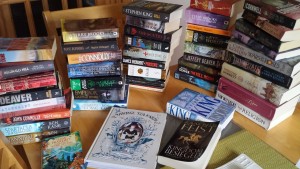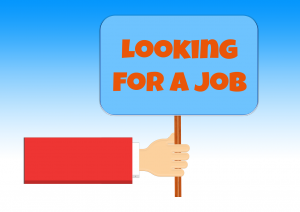 When I mentor interns, I often spend time thinking about what advice might be helpful to those who pursue career goals in the world of publishing. This month I’ve had the good fortune to have two interns working with Swenson Book Development LLC. They’ve both seen many of their friends and classmates graduate this June but both of them completed their third not final year of college. Alanna Rieser and Samantha Kolb will return to campus this fall as seniors so I wrote this in the hopes it will help them now and you, too, if you are new to the business of books.
When I mentor interns, I often spend time thinking about what advice might be helpful to those who pursue career goals in the world of publishing. This month I’ve had the good fortune to have two interns working with Swenson Book Development LLC. They’ve both seen many of their friends and classmates graduate this June but both of them completed their third not final year of college. Alanna Rieser and Samantha Kolb will return to campus this fall as seniors so I wrote this in the hopes it will help them now and you, too, if you are new to the business of books.
Do you imagine a career in book publishing? Editor, agent, writer.
How can you fulfill those aspirations? Those jobs aren’t usually entry-level positions. And it’s not as if writing term papers in French Literature or Macro Economics provides you with practical writing samples. College juniors, you’ve got a year to plan for choosing a path toward publishing. Writing better term papers isn’t enough. So how to prepare? Where to begin? and When?
Now. First steps this summer. Pick one or more!
 Get a part-time position at a bookstore. This is one of the first jobs where you can get paid to learn the merchandise, study the inventory, learn about readers and figure out what books sell and why. You’ll learn a lot from coworkers. Becoming a regular customer of your local bookstore also helps your chances of getting hired.
Get a part-time position at a bookstore. This is one of the first jobs where you can get paid to learn the merchandise, study the inventory, learn about readers and figure out what books sell and why. You’ll learn a lot from coworkers. Becoming a regular customer of your local bookstore also helps your chances of getting hired.
Go to author events and start to build your literary community. Talk to others who attend readings and introduce yourself to the speakers.
This summer spend some hours in your local library. Get to know your librarians. Ask them questions about books and ask for reading recommendations. Read a lot of books for pleasure this summer. They can always use volunteers.
 Get an internship at your local newspaper, regional magazine, or find a literary agency or publisher where you would like to eventually work and apply to their internship programs. If it is too late to apply this year, you have done your homework early for next summer. Get a jump-start by setting your own deadlines for 2017 applications. If you land a fall or spring internship during your senior year of college, your chances for full-time employment increase after graduation.
Get an internship at your local newspaper, regional magazine, or find a literary agency or publisher where you would like to eventually work and apply to their internship programs. If it is too late to apply this year, you have done your homework early for next summer. Get a jump-start by setting your own deadlines for 2017 applications. If you land a fall or spring internship during your senior year of college, your chances for full-time employment increase after graduation.
You might consider graduate school. Looking at the catalogs and program descriptions, follow your interests but don’t assume it is a fast-track to success in book publishing. The kind of writing done inside the academy rarely is published outside for public consumption. Dissertations almost never translate into books. As a recovering academic who left behind the golden handcuffs of tenure, please know I think graduate school is valuable in immeasurable ways, however, do not consider it a business investment with financial returns in the short term. You do not need an MFA to be a writer. You do not need to have a Masters or a Ph.D. to work in publishing.
You DO need to continue your education throughout your entire career.
 If you really want to pursue publishing you need to know there are professional programs which are the equivalent of a graduate degree and usually less than one year’s graduate school tuition ($6-10K plus housing). Harvard, Yale, NYU, and Columbia all have good programs or publishing courses which are more cost-effective for career advancement than an advanced degree. And you don’t need to enroll in one of these programs until you have had a couple of years’ experience working in publishing. So don’t feel any urgency to go straight from college into a publishing course/program or graduate school. Gain some work experience first. Continuing professional education isn’t a two year commitment; it’s a lifelong habit.
If you really want to pursue publishing you need to know there are professional programs which are the equivalent of a graduate degree and usually less than one year’s graduate school tuition ($6-10K plus housing). Harvard, Yale, NYU, and Columbia all have good programs or publishing courses which are more cost-effective for career advancement than an advanced degree. And you don’t need to enroll in one of these programs until you have had a couple of years’ experience working in publishing. So don’t feel any urgency to go straight from college into a publishing course/program or graduate school. Gain some work experience first. Continuing professional education isn’t a two year commitment; it’s a lifelong habit.
How can you gain work experience relevant to a career in publishing?
Internships are great, however, they often translate into corporate practices of extracting free labor in the publishing industry. Many entry-level full-time jobs list internships prior to employment under qualifications for the position. Internships sometimes leads to employment; often in circuitous routes through word-of-mouth referrals. At an internship, it isn’t only what you learn, but who you learn it from. Find one where you will be mentored and achieve your learning goals.
 Part-time employment and free-lancing can help you build your skill set for employment in the book business. Part-time work at a used bookstore, library, literary or book center, museum, social service agency, non-profit or business in a subject area of your literary interest is a good idea even if you can’t find full-time work during the first year or two of your pursuit of a publishing career path. Free-lancing requires an entrepreneurial attitude and lots of hard work without much direction or guidance, but if it pays and you gain experience, there’s nothing better to prepare you for publishing.
Part-time employment and free-lancing can help you build your skill set for employment in the book business. Part-time work at a used bookstore, library, literary or book center, museum, social service agency, non-profit or business in a subject area of your literary interest is a good idea even if you can’t find full-time work during the first year or two of your pursuit of a publishing career path. Free-lancing requires an entrepreneurial attitude and lots of hard work without much direction or guidance, but if it pays and you gain experience, there’s nothing better to prepare you for publishing.
Become familiar now with the various job boards for writers, agents, editors, and publishers like Media Bistro, Writers & Poets, Writers Digest, and Publisher’s Marketplace. Search the job listings during fall semester so you begin to recognize positions you can apply for before you graduate. It takes some time to learn how to scan the job listings and understand how to begin the job search process.
Recent Bureau of Labor Statistics data shows the publishing industry eliminated 25% of jobs in the last decade. (The data is worse for journalists: 60% of reporter positions eliminated in last 10 years.) If you can’t find the perfect entry-level position in publishing, don’t give up hope. The recent mergers and acquisitions within commercial trade publishing today will work their way through in the next 18 months to two years and eventually they’ll be looking to hire someone like you. For the next year you could also look for entry level positions in communications in the insurance, banking, marketing, real estate, medical, advertising, or public relations sectors. Having a day job already increases your chances of being hired. Gaining work experience where communications can affect the bottom line prepares you for full-time employment in the publishing sector. Working in journalism or writing free-lance for magazines is a wonderful way to work yourself into a full-time gig, however, you may need to live at home as most reporters don’t earn a living wage.
 Stay informed by reading Publishers Weekly and Shelf Awareness. Reading the industry trade news is as important for someone looking to work in publishing as it is to read Variety and Entertainment Week if someone hopes to gain employment in the entertainment industry. And read Writers Digest, Poets & Writers, and at least one literary journal with the kind of writing you enjoy.
Stay informed by reading Publishers Weekly and Shelf Awareness. Reading the industry trade news is as important for someone looking to work in publishing as it is to read Variety and Entertainment Week if someone hopes to gain employment in the entertainment industry. And read Writers Digest, Poets & Writers, and at least one literary journal with the kind of writing you enjoy.
Keep reading. If you want to go into publishing there are many avenues toward your goal but all of them involve a passion for reading books. Read beyond your comfort zone. Read the classics you didn’t have time to read during college. Read for pleasure, especially for pleasure.
What may not be obvious as you begin your journey into the business of books is how long it takes to make good books. There are no shortcuts to excellence. My advice is to give yourself permission to work toward this career goal five or ten years instead of one or two.
And write. If you were a musician you’d keep playing even though you didn’t have a paid position in a professional orchestra. If you were an athlete, would you hang up your skates if you didn’t get drafted by the NHL? Practice the craft. Ask to be paid for your work. Act like a professional. Write. Every day.
What advice would you give someone who is starting out in the field of publishing?
